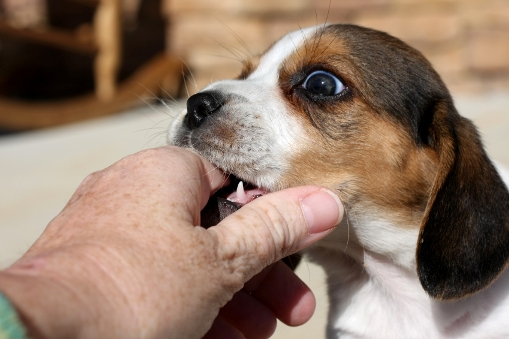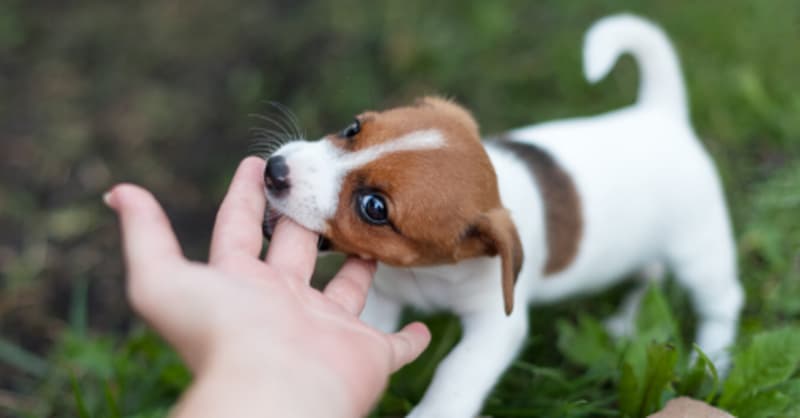Dogs start biting early in life. Like human infants, it is common for them to chew objects during teething to reduce discomfort. Dogs’ teeth are so sharp that they often don’t know how hard they bite. Although puppy biting is a completely natural behavior in the puppy stage, it is also important to let your puppy know what is allowed and not allowed to chew. Want to learn how to stop a dog from biting? Here are the steps to stop the dog from biting.
Why Is My Puppy Biting
Dogs bite because this is how they discover and interact with the world around them. They can’t pick things up with their claws, so they try to do it with their mouths!
It is important to know that dog bites are very normal and expected. Almost anyone who has had a puppy has experienced biting in one way, shape, or form.
Let me repeat… It’s normal for a dog to bite.
How Long Will Puppy Biting Last
Generally, it takes about 3-6 months. Yes, it was quite a long time!
Just like anything related to dogs, each dog has a different background, environment, breed history, etc., which means that each dog’s different behavior will be different! I have two experimental pups from the same parents (different nests), and even their behaviors, challenges and success are quite different.
Remember, every dog is different! If your puppy needs more than six months, that’s good! Focus on small “wins”, apply the techniques I’m going to tell you, and most importantly, be patient.
Another thing to note is that some persistent behaviors that you feel are becoming serious should be directed to the local dog trainer near you. Find someone who understands the latest science-based methods and make motivation their first choice.
How to Stop Puppy Biting

Teach Your Dog That Biting Means “The Game Is Over”
If your dog bites you while playing, it means that the playtime is over, without exception. Yelling at your dog or physically punishing your dog sounds strange and is a reward. It tells them that biting will get some kind of response from you, which is the so-called positive punishment. It may also make them afraid of being dealt with. Instead, teach them that biting won’t get them anything.
Teach Your Puppy Bite Inhibition
Learning how to reduce bite force is very important for all dogs. Sometimes they may feel pain or fear, and then they will put their mouth on you or someone else. But if they learn to bite and restrain, they will understand that they should not bite hard. Dogs naturally bite each other when playing. If they bite too hard on their mother or litter, another dog may make a loud cry to warn the dog, “Hey, it hurts!”
Depending on the dog, you can also say “Wow!” To teach this. If they bite you, they make a noise. Be careful, though, because, for some puppies, this actually makes them more excited and may bite. In this case, it is best to turn around quietly, walk away, or gently put the puppy into the cage for a few minutes to calm down. If they really flinch, be sure to reward your dog and give some verbal praise.
Some dog owners use a bitter spray to stop puppies from chewing and biting.
Prevent a Surprise Attack
If your dog jumps on your legs or feet when you walk, this is a common naughty dog behavior. It is recommended that you put a high-value snack next to your legs when you walk to help the dog learn to walk well next to you. Use the same strategy when teaching puppies to walk on a leash.
Provide Quiet Time or Rest in the Toilet
Sometimes a biting puppy is really an over-tired puppy, so they need to sleep in a quiet space or crate. At other times, they may need a break, or they may just be hungry or thirsty.
Never Hit Your Dog
Never beat or otherwise physically punish your dog. If your pet seems to bite because of aggression, discuss with your veterinarian or dog trainer how to manage this behavior.
Let Them Pause
Gently place your puppy in the crate to give them a chance to calm down and prevent them from biting. It’s important to make sure they don’t associate crates with punishment, so stay calm. Once the dogs calm down, you can let them out.
Help Burn Some Energy
When the dog continues to bite, even if you change the toy many times, it may only need to consume some physical or mental energy. Take them to the yard and watch them running around.
Give Your Puppy a Substitute to Chew
It is a good idea to always keep your puppy chewing toy handy so that you can predict biting behavior and replace your hand or furniture with a toy. Doing so will let the puppy know what can be bitten or chewed. If they start nibbling at your fingers or toes while you are playing, please provide a toy.
Similarly, if they continue to bite, please stop the game immediately. If you have been training your puppies to sit down, you can also redirect them by making them sit down and rewarding toys.
Reinforce the Behavior You Want
We sometimes forget that when our puppy is calm and quiet, we should reinforce this with a “good dog” or a piece of roughed food or a pat. You will help them understand the behavior you are looking for through positive reinforcement.
Sign up for Puppy Class
Puppy classes or other well-run local classes will provide your puppy with opportunities to interact with other dogs.
At first, teaching your little manic to bite people politely to their mouths seems to be a huge challenge. Patience and consistency are key. Some puppies may flinch at one play and then bite their teeth at the next.
Summary
Most importantly, remember to be patient with yourself and your puppy. Although it seems like their progress is slow (or non-existent), any progress is good progress!
Be consistent as you work to stop the puppy from biting. Your puppy may be confused when the inconsistency develops gradually. We all know that confusion does not equal progress!





